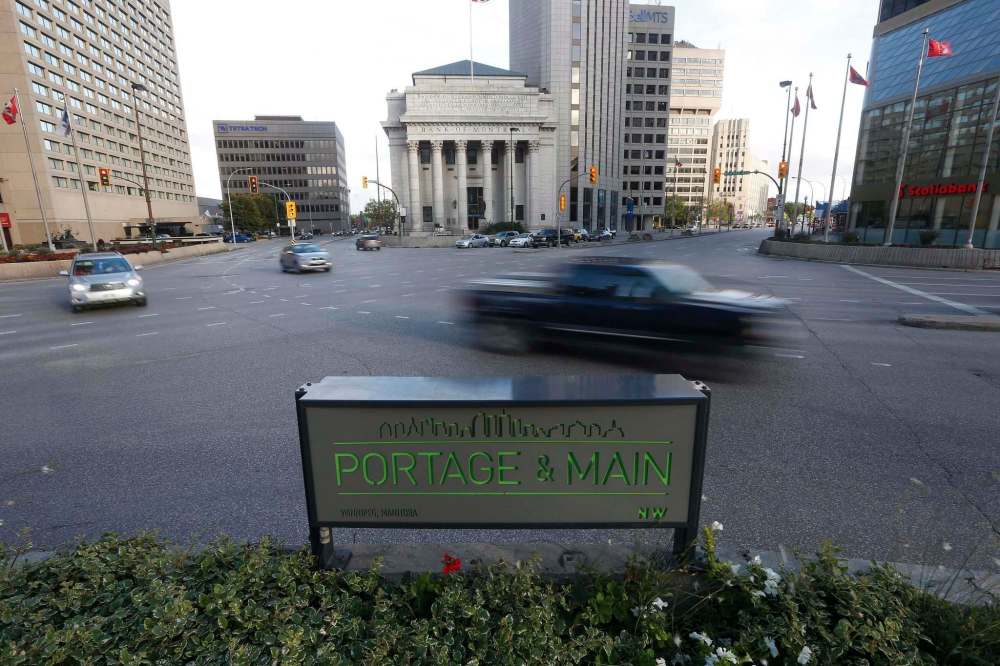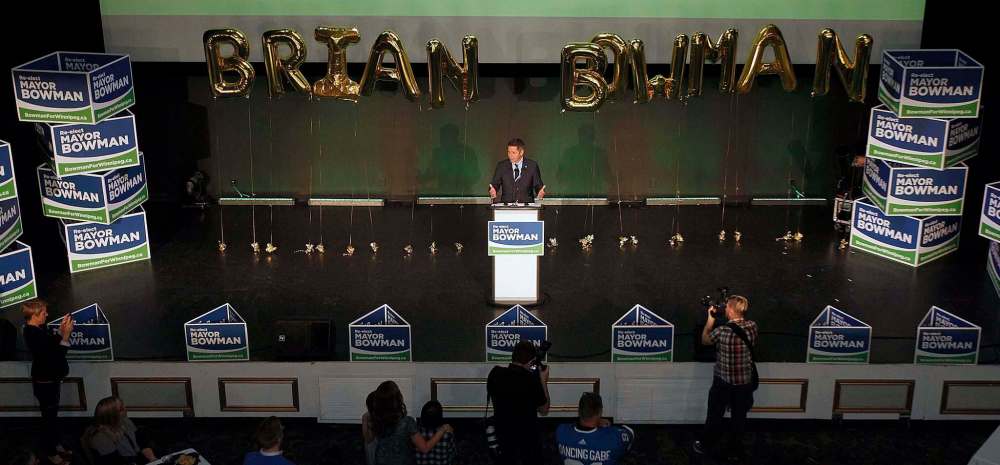Blurred vision
Why didn't the Winnipegger cross the road? There wasn't much to get excited about on the other side; new ideas, passion missing from civic election
Advertisement
Read this article for free:
or
Already have an account? Log in here »
To continue reading, please subscribe:
Monthly Digital Subscription
$0 for the first 4 weeks*
- Enjoy unlimited reading on winnipegfreepress.com
- Read the E-Edition, our digital replica newspaper
- Access News Break, our award-winning app
- Play interactive puzzles
*No charge for 4 weeks then price increases to the regular rate of $19.00 plus GST every four weeks. Offer available to new and qualified returning subscribers only. Cancel any time.
Monthly Digital Subscription
$4.75/week*
- Enjoy unlimited reading on winnipegfreepress.com
- Read the E-Edition, our digital replica newspaper
- Access News Break, our award-winning app
- Play interactive puzzles
*Billed as $19 plus GST every four weeks. Cancel any time.
To continue reading, please subscribe:
Add Free Press access to your Brandon Sun subscription for only an additional
$1 for the first 4 weeks*
*Your next subscription payment will increase by $1.00 and you will be charged $16.99 plus GST for four weeks. After four weeks, your payment will increase to $23.99 plus GST every four weeks.
Read unlimited articles for free today:
or
Already have an account? Log in here »
Hey there, time traveller!
This article was published 26/10/2018 (2606 days ago), so information in it may no longer be current.
The morning after landed like a hangover, glazed by the hazy yellow light of an overcast sky. One of those mornings where you lie awake for a few moments, blinking, piecing together fragments of memory: what happened last night?
Oh yeah, that’s right. We had an election. Strange, how quickly it feels like it didn’t happen.
The best thing that can be said about the 2018 civic election is that — like most Canadian elections — it ran smoothly, thanks to the dedication of poll workers. So many people in the world face so many barriers to vote; we are so lucky.

The second-best thing that can be said about this election is that it’s over.
This election was not the city’s finest hour. On Twitter, observers from across Canada poked fun at the basis of our plebiscite, nearly unthinkable elsewhere. One journalist, writing in a purely factual manner, called it a “national joke.”
Another highlight, from Twitter: “Wait. Hold on. Did Winnipeg srsly have a plebiscite on crossing the street?”
Yeah, we did. Don’t worry, Canada: Winnipeggers — for the most part — weren’t too enthused about it either.
It was an election of staying put, status quo, risking little. Local journalist James Wilt, writing for Vice, called it “one of Canada’s sadder municipal elections.” The low bar we cleared was not having a white supremacist running for mayor.
And voter turnout, just 42 per cent and with nearly 20,000 fewer votes cast than 2014, reflects that. Those figures aren’t an indictment of people who chose not to vote. It’s an indictment of a cycle that failed to light voter imagination.
Voters aren’t so unpredictable. They want something to vote for, not only against. They want to choose a vision that gives them hope, not only give their consent to maintain a status quo. Where was that momentum in this election?
Maybe, if we look inward, we conclude that we get the elections we deserve. Or, maybe, this city deserved better.
Every incumbent was re-elected, save for the battle of St. James, where ward boundary changes pitted two incumbents against each other. There will be five new faces on council, all of them from wide-open races.
Even the fact that voters in the new Waverley West ward didn’t get a choice seems a disservice. Coun. Janice Lukes, who previously represented the old South Winnipeg-St. Norbert ward, was acclaimed to the job, the first unopposed race since 2002.
At least Winnipeg, in this regard, fared better than Brandon, where Mayor Rick Chrest and two councillors were acclaimed to their positions. Just 17 per cent of Brandon’s voters bothered to cast ballots in the other eight city council races or to elect four new school trustees on the nine-member board.
Meanwhile, Winnipeg remains a city steeped in potential. We have some good things going for us. Relative stability. Affordability, for some. A downtown and an Exchange District that are coming to life bit by bit with new investment.
We also have one of the highest child-poverty rates in Canada. A slew of historic neighbourhoods in desperate need of revitalization. Gaps in recreation infrastructure. Transit service that lags behind comparable cities in nearly every measurable way.
All of these issues, and more, could make Winnipeg fertile ground for fresh thinking. It could make us a place where candidates jostle to advance innovative, practical ideas that would serve as a model for other cities.
We could have had substantive, insightful dialogue on issues that affect everyone living here, directly or indirectly: housing, poverty, visions for vital neighbourhoods, urban-suburban relationships, transit and growing industry.
Instead, this is what we got: an election where the most impassioned debates regarded a plebiscite nobody truly wanted, and the matter of whether a person feels like they’ll get stabbed when walking downtown. Gripping stuff.
And if it hadn’t been for the plebiscite — which tripped Winnipeg’s most crackling switches — maybe more energy would have been spared for other issues. That it went to a plebiscite was a political move; it fulfilled its purpose.

When it was tossed to a ballot question, the Portage and Main debate sucked the air out of the room. It was, rightly or wrongly, one of the city’s most divisive issues. Opinions were calcified from the start; it was never going to be yes.
In that light, supporters of opening the intersection to pedestrians — myself included, I guess — were given a futile choice: they could lie down and give up on an idea they cared about. Or, they could at least stand up behind it.
The public debate was often brittle and fracturing. As the numbers showed, advocates’ passion moved few Winnipeggers. But hey, at least they tried, giving of their own time and money to promote a distinctly new vision.
They didn’t get the “yes” vote they wanted. Yet it was not a wasted endeavour. Advocates succeeded at bringing accessibility issues to the forefront of the discussion and many councillors have voiced their support for improvement.
Not every dream ventured will come to fruition. But in exploring them on the city’s most public stage, in advancing civic imagination, there is always the chance for other voices and ideas to rise up. That alone is worth the striving.
We would be blessed to have more of that dreaming in Winnipeg. It cannot come only from everyday citizens.
Now, in the hazy light of the morning after, awash in frustration at an election that took so much out of us and yet ventured so little, I return to one, simple wish — next time around, we can revel in campaigns that ignite us.
It’s not such a tall order. In fact, we already have a recent template for that kind of thing.
Four years ago, a little-known lawyer named Brian Bowman entered the mayoral race. He had no political experience, but he assembled a slate of appealing ideas and rode a wave of momentum to the city’s top office.
Many of the pledges he made then remain unfulfilled. And the reality of politics is that few politicians can achieve all they promise. Still, the contrast between the ideas Bowman articulated then and now is striking.
This time around it was mostly broad brushstrokes, soft on the details, impressionist dabs promising more of the same. This election, with no other candidate offering a vision that was more exciting, that was enough to get him re-elected.
So now, the city returns to its slow simmer. Waiting for leadership to light a flame. Waiting for 2022, and the hope of campaigns that revel in the contours of what a city can be, and for champions ready to take a leap on new wings.
melissa.martin@freepress.mb.ca
Our newsroom depends on a growing audience of readers to power our journalism. If you are not a paid reader, please consider becoming a subscriber.
Our newsroom depends on its audience of readers to power our journalism. Thank you for your support.


